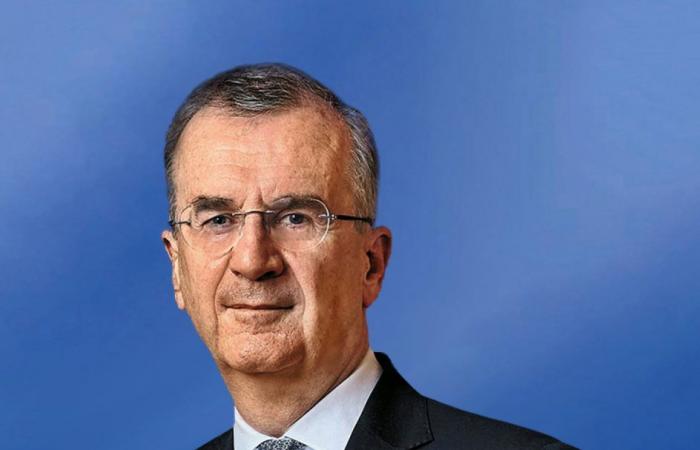Growth in Europe is weakening, some countries are in recession. Should we expect a rate cut as early as the October ECB meeting?
“Yes, very probably, as President Lagarde suggested before the European Parliament last Monday. But not exactly for the reason you mention: our compass for monetary policy and rate cuts is above all inflation, which once again surprised on the downside and returned below 2% in September, at 1.8%. Certainly, core inflation remains at 2.7%, with the rise in service prices being more persistent at 4%; but it should gradually decline to approach 2% next year. Market expectations for inflation in 2025 are even lower than our forecasts, below 1.8%. All this means that the balance of risks has shifted. Over the past two years, our main risk was exceeding our 2% target. We must now also be attentive to the opposite risk, that of missing our target from below due to low growth and restrictive monetary policy for too long. Another measure of this risk is to look at the options market: the chance of inflation above 2.5% over the next five years is now just 17%, while the chance of it being less than 1.5% is 38%, more than double.”
Are you satisfied with the trajectory of inflation or do you still see the risk of a sharp increase in price dynamics, also due to the price of oil?
“Victory against inflation is in sight, but that is no reason to rest on our laurels and relax our vigilance by following a predefined course. At the last Governing Council meeting, I strongly insisted that we retain all our optionality for October, and rightly so. Today, I will not change my mind and I will not abandon a pragmatic approach, meeting by meeting, which, by the way, for me has never meant quarter by quarter. Concerning the price of oil and the Middle East, we must carefully monitor this very volatile situation. However, as long as it is temporary and does not impact underlying inflation, a rise in oil prices should not necessarily change our monetary policy. Even less if this increase were to slow down growth in Europe.”
Should we expect a more aggressive rate reduction? The Fed recently made a half-point cut.
“We are obviously independent of the Fed. We started cutting rates earlier, in June, and we have now lowered them to 3.5%, while they can reach up to 5% in the United States. But on both sides of the Atlantic, the trend is clearly towards further rate cuts. We will see how high the terminal rate: if you look at market expectations, rates in the Eurozone could be as low as 2% at the end of next year, or even lower. I prefer to express it this way: if next year we stay at 2% inflation for the long term, and with growth prospects still sluggish in Europe, there will be no reason to maintain our monetary policy in restrictive territory, and that our rates are at a level above the neutral interest rate.”
Germany, the euro zone’s largest economy, does not seem able to overcome the phase of stagnation and recession that began in 2020. Do you think that one of its problems could be the debt brake?
“We should not focus on any one country: sluggish growth is a pan-European problem. It’s quite striking: if we consider economic weight, European and American GDP are equivalent. But in terms of speed (growth), Europe is much weaker. Of course, Germany particularly suffered from Russia’s war against Ukraine and the resulting gas crisis, as well as the Chinese slowdown. Regarding the debt brake, I will not comment on any particular budgetary policy. In France, for example, we clearly have the opposite problem, that of an excessive deficit. I will only say this: we now have a common budgetary framework in Europe, the revised Stability Pact. Each country should stick to this common framework, it’s better than having specific national rules.”
ECB President Christine Lagarde said: “We have faced the worst pandemic since the 1920s, the worst conflict in Europe since the 1940s and the worst energy shock since the 1970s.” Do you think this has contributed to the rise of the far right in your country, France, in Italy or in Germany? And what can central banks do in the face of these multiple crises?
“The Banque de France is independent: we serve all French and European citizens and we make no political comments. But I would say that in this difficult environment, there is a common problem of trust, or fear, among European citizens. Where central banks can make their contribution is by restoring confidence in the economic and monetary domain. Inflation was a very real fear, very harmful for our fellow citizens, especially the most modest. When we win the battle against inflation, we make a very important contribution to restoring confidence and living standards.”
Mario Draghi’s report was the subject of much debate on one point: he suggested that Europe should invest 800 billion euros per year to avoid “agony”. Do you share his opinion?
“There was a slight misunderstanding. Mario Draghi mentioned this figure of an investment deficit of 800 billion to succeed in the transition, but he did not mention a precise distribution between public financing and private financing. However, everyone was quick to position themselves for or against a hypothesis that did not appear there: that of financing mainly using Eurobonds. And let’s not forget that this is only part of this fundamental report from Mario Draghi, as he himself recently highlighted.”
But European countries have narrow budgetary margins – France has a high deficit, Italy a huge public debt and the debt brake is imposed in Germany. Where could the money come from, if not from Eurobonds?
“The solution is not easy, but it falls into two dimensions. Let us first look at the quality of public spending. We should make it more of a priority: money allocated to investments is more promising for growth than money allocated to current spending. This point is never debated. We should look at the best performing countries in each area – health, education, security, etc. – and try in a very pragmatic way to transpose their effective policies. Second, there is also private savings to finance the necessary investments. In another important recent report, Enrico Letta advocates a “Savings and Investment Union”: how can we mobilize the considerable surplus of private savings – 2% of European GDP – to finance our investment needs? investment which amounts to 5% of GDP? We are talking about a possibly significant part of these. Europeans should listen to these two great Italians, Draghi and Letta.”
So what are the most important passages in the Draghi report for you?
“Mario Draghi strongly advocates three essential changes: energy (and therefore the climate), innovation, simplification. And for each of them, he makes proposals which are very often structural, not financial. For example: when it comes to competition policy, the authorities should systematically take a European point of view and no longer a national point of view. Unfortunately, there is a serious risk that short-termist governments will bury these structural reforms. Therefore, as central banks, we must raise our voices more strongly in support of these reforms, as my colleague and friend Governor Panetta is doing in Italy. What is at stake is so important that we must overcome some of the bureaucratic resistance that we see too often.”
What do you mean ?
“Take the example of more integrated capital markets: Christine Lagarde suggested unified market supervision like in the United States, for example with ESMA. The issue is our collective economic success, it is not a question of bureaucratic power for national authorities.”
Don’t you think that the heart of the Draghi and Letta reports, therefore the need for further integration, is threatened by the rise of far-right movements throughout Europe?
“Our fellow citizens expect real and concrete progress. They want results. For most of them, it is less about ideology than about action: in terms of simplification, energy transition or defense. And if you look at the political environment: Brexit has not had a contagion effect in Europe, on the contrary. Today, fewer and fewer Europeans want to leave Europe.”
The Banking Union was decided in 2010, but we are still far from having completed it. What should the priorities be?
“I am slightly more optimistic about the Banking Union. We have built a strong Supervisory Union, whose 10th anniversary we have just celebrated. Nine years ago, when I became governor of the French Central Bank, we were really faced with the problem of the fragility of European banks and the risk of a European banking crisis. This risk has now disappeared, despite the fact that we had to raise interest rates and there was a banking crisis last year in the United States and Switzerland – with Silicon Valley Bank and Credit Suisse. But in terms of creating pan-European banks and having larger banks with a cross-border dimension, we are not there yet.
Speaking of pan-European banks: Unicredit is preparing to buy Commerzbank. But German unions, politicians, and even the Chancellor have rebelled against this “hostile takeover”, as Olaf Scholz called it. What do you think?
“I do not comment on individual cases. But allow me two general remarks. First: the issue should not be political or nationalist in nature, in any country. Fortunately, thanks to the Banking Union, the decision-making process is in the hands of a European institution with an independent and technical assessment, namely the ECB. Secondly, what the ECB will have to judge is not only the proposed agreement itself, with its financial advantages and tricks, but also, and above all, the solidity, sustainability and governance of a possible new band “.
The ECB and competition policy represent great European successes – ones where countries give up their sovereignty and Europe becomes a global power. Shouldn’t this be emphasized more?
“You are right: Europe is respected around the world in these two areas of currency and competition. This is no coincidence: the existence of independent European authorities, the result of a clear democratic process, can help achieve common political objectives. Independence must of course be based on a clear democratic mandate, and we must achieve results. To go further on shared sovereignty, the answer lies with political leaders.”






